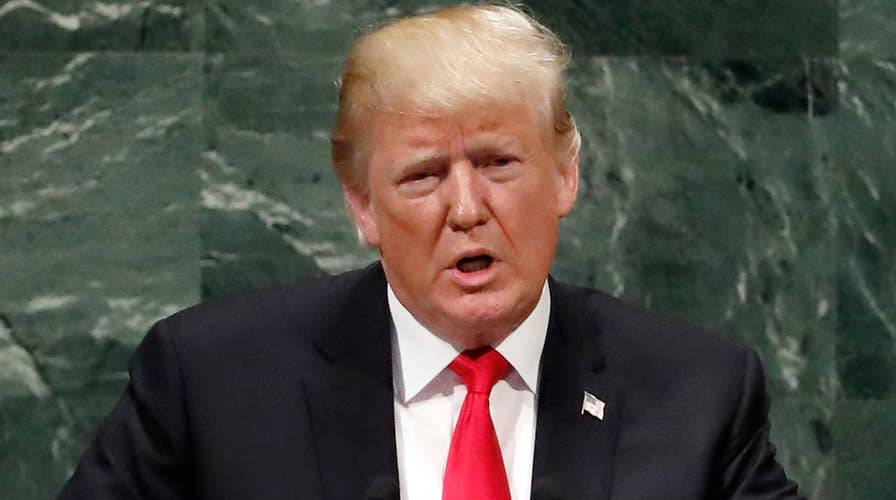Trump calls on nations to isolate Iran's regime at UN
'We cannot allow the world's leading sponsor of terrorism to possess the planet's most dangerous weapons,' President Trump says at the United Nations General Assembly.
The U.S. military preparedness for a possible confrontation in the Persian Gulf is lagging behind the Trump administration's increasingly harsh rhetoric towards the Iranian regime, military experts say.
Military officials told The Wall Street Journal that the U.S. military haven't had a U.S. aircraft carrier in the Persian Gulf since March, which is the longest period in the two decades. The U.S. military normally maintained presence in the region over the years.
Defense Secretary Jim Mattis also announced pulling four Patriot missile-defense systems out of Jordan, Kuwait and Bahrain this month in a bid to ramp up military capabilities against Russia and China and away from the Middle East, according to the Journal.
This comes at the same time President Trump has openly criticized Iran and imposed tough sanctions against the regime. In July, the White House blamed Iranian President Hassan Rouhani for inciting Trump to respond with a threat of war after Rouhani said "America must understand well that peace with Iran is the mother of all peace and war with Iran is the mother of all wars."
But for many experts, the contradiction between Trump's rhetoric and the declining U.S. military's capabilities in the region signal that the administration doesn't actually see the Iranian regime as the main threat in the world. According to the 2018 U.S. national security strategy, Russia and China are the greatest threats to the U.S. and its interests in the world. Still, experts warned against underestimating the Iranian threat.
“The concern is the president looks [like] a Twitter tiger," said Mark Dubowitz, chief executive of the Foundation for Defense of Democracies, told the Journal. "If the rhetoric is not backed by a credible threat and a credible presence of American military power, then there is a danger that Iran will assess there is American mush, not American steel, behind the president’s tough rhetoric."
The proponents of the administration say that Trump isn't seeking for a military confrontation with Iran and instead wants to pressure them into a dialogue, just as he did with North Korea. Yet Trump denied he's planning to meet the Iranian leader, though noted that he may be open to such possibility in the future. "Despite requests, I have no plans to meet Iranian President Hassan Rouhani. Maybe someday in the future. I am sure he is an absolutely lovely man!" he wrote in a tweet.
The White House also portrayed the Iranian regime as one of the U.S. national security threats during a speech at the United Nations last week. "Iran’s leaders sow chaos, death and destruction. They do not respect their neighbors or borders, or the sovereign rights of nations," the president said.
DIPLOMATS EVACUATED FROM US CONSULATE IN IRAQ BECAUSE OF IRANIAN-BACKED VIOLENCE
The State Department also accused Iran of backing militias in Iraq that threatened the U.S. Consulate in in an Iraqi town. Secretary of State Mike Pompeo temporarily closed down the consulate amid the violence from militias and warned Iran that U.S. will retaliate in the event of an attack on Americans.
"I have made clear that Iran should understand that the United States will respond promptly and appropriately to any such attacks," Pompeo said in a statement. "I have advised the Government of Iran that the United States will hold Iran directly responsible for any harm to Americans or to our diplomatic facilities in Iraq or elsewhere and whether perpetrated by Iranian forces directly or by associated proxy militias."






